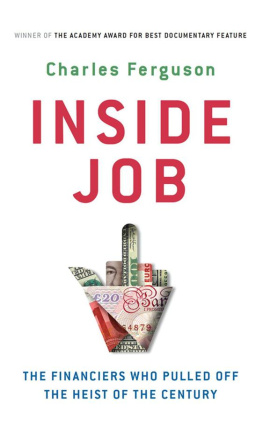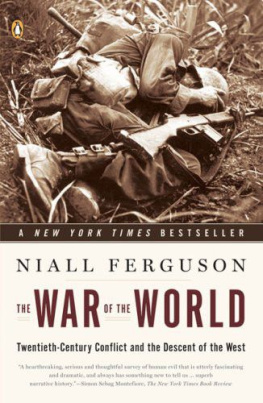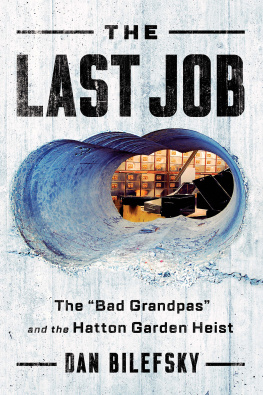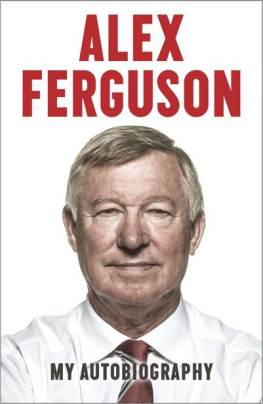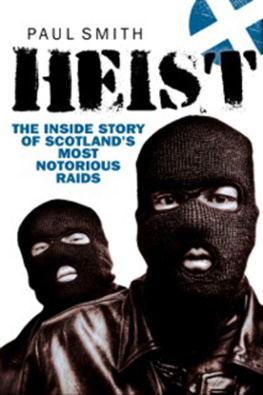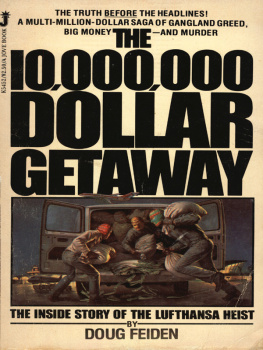Charles Ferguson - Inside Job: The Financiers Who Pulled Off the Heist of the Century
Here you can read online Charles Ferguson - Inside Job: The Financiers Who Pulled Off the Heist of the Century full text of the book (entire story) in english for free. Download pdf and epub, get meaning, cover and reviews about this ebook. year: 2012, publisher: Oneworld, genre: Politics. Description of the work, (preface) as well as reviews are available. Best literature library LitArk.com created for fans of good reading and offers a wide selection of genres:
Romance novel
Science fiction
Adventure
Detective
Science
History
Home and family
Prose
Art
Politics
Computer
Non-fiction
Religion
Business
Children
Humor
Choose a favorite category and find really read worthwhile books. Enjoy immersion in the world of imagination, feel the emotions of the characters or learn something new for yourself, make an fascinating discovery.
- Book:Inside Job: The Financiers Who Pulled Off the Heist of the Century
- Author:
- Publisher:Oneworld
- Genre:
- Year:2012
- Rating:3 / 5
- Favourites:Add to favourites
- Your mark:
- 60
- 1
- 2
- 3
- 4
- 5
Inside Job: The Financiers Who Pulled Off the Heist of the Century: summary, description and annotation
We offer to read an annotation, description, summary or preface (depends on what the author of the book "Inside Job: The Financiers Who Pulled Off the Heist of the Century" wrote himself). If you haven't found the necessary information about the book — write in the comments, we will try to find it.
Inside Job: The Financiers Who Pulled Off the Heist of the Century — read online for free the complete book (whole text) full work
Below is the text of the book, divided by pages. System saving the place of the last page read, allows you to conveniently read the book "Inside Job: The Financiers Who Pulled Off the Heist of the Century" online for free, without having to search again every time where you left off. Put a bookmark, and you can go to the page where you finished reading at any time.
Font size:
Interval:
Bookmark:
INSIDE JOB
ALSO BY CHARLES FERGUSON
High Stakes, No Prisoners:
A Winners Tale of Greed and Glory in the Internet Wars
No End in Sight:
Iraqs Descent into Chaos
The Broadband Problem:
Anatomy of a Market Failure and a Policy Dilemma
Computer Wars
(coauthored with Charles Morris)

A Oneworld Book
First published in Great Britain and the Commonwealth by
Oneworld Publications Limited 2012
Copyright 2012 by Charles Ferguson
The moral right of Charles Ferguson to be identified as the Author of this work has been asserted by him in accordance with the Copyright, Designs and Patents Act 1988
All rights reserved
Copyright under Berne Convention
A CIP record for this title is available from the British Library
ISBN 978-1-85168-915-6
eISBN 978-1-78074-072-0
Cover illustration and design by Jamie Keenan
Book design by Nicola Ferguson
Printed and bound in the Great Britain
by Bell & Bain Ltd
Oneworld Publications Limited
185 Banbury Road, Oxford, OX2 7AR, England
Stay up to date with the latest books, special offers, and exclusive content from Oneworld with our monthly newsletter
Sign up on our website
www.oneworld-publication.com
To Athena Sofia and Audrey Elizabeth, two women who changed my life
CONTENTS
CHAPTER 1
WHERE WE ARE NOW
M ANY BOOKS HAVE ALREADY been written about the financial crisis, but there are two reasons why I decided that it was still important to write this one.
The first reason is that the bad guys got away with it, and there has been stunningly little public debate about this fact. When I received the Oscar for best documentary in 2011, I said: Three years after a horrific financial crisis caused by massive fraud, not a single financial executive has gone to jail. And thats wrong. When asked afterwards about the absence of prosecutions, senior officials in the Obama White House gave evasive nonanswers, suggesting that nothing illegal occurred, or that investigations were continuing. None of the major Republican candidates for the US presidency have raised the issue at all.
As of early 2012 there has still not been a single criminal prosecution of a senior financial executive related to the financial crisis. Nor has there been any serious attempt by the US government to use civil suits, asset seizures, or restraining orders to extract fines or restitution from the people responsible for plunging the world economy into recession. This is not because we have no evidence of criminal behaviour. Since the release of my film, a large amount of new material has emerged, especially from private lawsuits, that reveals, through e-mail trails and other evidence, that many bankers, including senior management, knew exactly what was going on, and that it was highly fraudulent.
But even leaving this crisis aside, there is now abundant evidence of widespread, unpunished criminal behaviour in the financial sector. Later in this book, I go through the list of what we already know, which is a lot. In addition to the behaviour that caused the crisis, major US and European banks have been caught assisting corporate fraud by Enron and others, laundering money for drug cartels and the Iranian military, aiding tax evasion, hiding the assets of corrupt dictators, colluding in order to fix prices, and committing many forms of financial fraud. The evidence is now overwhelming that over the last thirty years, the US financial sector has become a rogue industry. As its wealth and power grew, it subverted the political system (including both American political parties), government, and academic institutions in order to free itself from regulation. As deregulation progressed, the industry became ever more unethical and dangerous, producing ever larger financial crises and ever more blatant criminality. Since the 1990s, its power has been sufficient to insulate bankers not only from effective regulation but even from criminal law enforcement. The financial sector is now a parasitic and destabilizing industry that constitutes a major drag on economic growth.
This means that criminal prosecution is not just a matter of vengeance or even justice. Real punishment for large-scale financial criminality is a vital element of the financial re-regulation that is, in turn, essential to the worlds economic health and stability. Regulation is nice, but the threat of prison focuses the mind. A noted expert, the gangster Al Capone, once said, You can get much further in life with a kind word and a gun than with a kind word alone. If financial executives know that they will go to jail if they commit major frauds that endanger the world economy, and that their illegal wealth will be confiscated, then they will be considerably less likely to commit such frauds and cause global financial crises. So one reason for writing this book is to lay out in painfully clear detail the case for criminal prosecutions. In this book, I demonstrate that much of the behaviour underlying the bubble and crisis was quite literally criminal, and that the lack of prosecution is nearly as outrageous as the financial sectors original conduct.
The second reason that I decided to write this book is that the rise of predatory finance is both a cause and a symptom of an even broader, and even more disturbing, change in the economy and political system that governs the US and the rest of the world. The American financial sector is the core of a new oligarchy that has risen to power over the past thirty years, and that has profoundly changed our way of life. The later chapters of this book are devoted to analysing how this happened and what it means.
Starting around 1980, American society began to undergo a series of deep shifts. Deregulation, weakened antitrust enforcement, and technological changes led to increasing concentration of industry and finance. Money began to play a larger and more corrupting role in politics. The shifts could be felt in education, in infrastructure, and in the performance of many major industries. Inequality increased. As a result of these and other changes, America was turning into a rigged gamea society that denies opportunity to those who are not born into wealthy families, one that resembles a third-world dictatorship more than an advanced democracy. And others are mimicking these changes, by plan or by accident.
The Occupy protests that began in New York City in September 2011, and then rapidly spread around the world, were initially somewhat unclear in their goals. But the protesters were deeply right about one thing: over the last thirty years, their nations have been taken over by an amoral financial oligarchy. In particular, the American dream of opportunity, education, and upward mobility is now largely confined to the top few percent of the population. US government policy is increasingly dictated by the wealthy, by the financial sector, and by powerful (though sometimes badly mismanaged) industries such as telecommunications, health care, car manufacturing, and energy. These policies are implemented and praised by these groups willing servants, namely the increasingly bought-and-paid-for leadership of Americas political parties, academia, and lobbying industry.
If allowed to continue, this process will engender a declining, unfair society with an impoverished, angry, uneducated population under the control of a small, ultrawealthy elite. Such a society would be not only immoral but also eventually unstable, dangerously ripe for political extremism. And this will have consequences far beyond Americas shores, as the 2008 financial crisis demonstrated with great pain.
Next pageFont size:
Interval:
Bookmark:
Similar books «Inside Job: The Financiers Who Pulled Off the Heist of the Century»
Look at similar books to Inside Job: The Financiers Who Pulled Off the Heist of the Century. We have selected literature similar in name and meaning in the hope of providing readers with more options to find new, interesting, not yet read works.
Discussion, reviews of the book Inside Job: The Financiers Who Pulled Off the Heist of the Century and just readers' own opinions. Leave your comments, write what you think about the work, its meaning or the main characters. Specify what exactly you liked and what you didn't like, and why you think so.

